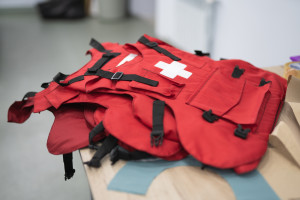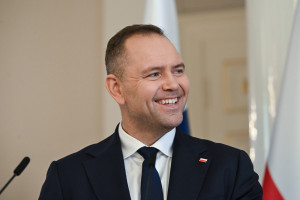Farewell to the Minister of Medicines. "Thanks to our joint work, we managed to implement many changes."

Author: prepared by JKB • Source: Rynek Zdrowia • Published: September 10, 2025 11:30
As previously announced, the Ministry of Health has seen the departure of its deputies, who were appointed during Izabela Leszczyna's term. Deputy Minister Marek Kos, who handled drug policy at the ministry, has also been dismissed.
Marek Kos, the former Undersecretary of State at the Ministry of Health, officially left the ministry in a letter. "As I conclude my mission as Deputy Minister of Health, I would like to express my profound gratitude to everyone with whom I had the honor of working during this exceptional time," he wrote.
"I would like to thank my superiors for the trust they have placed in me, my fellow deputy ministers for their collaborative efforts, constructive conversations, and mutual support, and the representatives of institutions under the Ministry of Health for their professionalism and willingness to act. I would also like to thank all the experts, social partners, and representatives of patient and industry organizations with whom I had the honor of meeting and collaborating for their substantive discussions, joint initiatives, and real influence on shaping health policy," Kos said.
He also thanked the team at the Department of Drug Policy and Pharmacy and the Department of Safety. "Thanks to our joint work, we have managed to implement many important changes. The last year and a half has been a time of intense work, but above all, real and lasting changes in patient access to modern therapies and in the organization of the emergency medical system," he concluded.
The Deputy Minister listed what they had managed to achieve together, including:
- in the area of drug reimbursement:
- cover as many as 236 therapies, including:
- 77 oncology therapies, including gynecological, urological, lung and hemato-oncological cancers (including CAR-T therapies and bispecific antibodies), - 159 non-oncology therapies and 67 therapies dedicated to rare diseases, including:
- expanding access to cystic fibrosis treatment (Kaftrio and Kalydeco),- reimbursement of Hemlibra for children with severe hemophilia A, making Luxturna gene therapy available,- reimbursement of Voxzogo for patients with achondroplasia,- breakthrough changes in diabetology and child psychiatry,
- reimbursement of drugs used in the in vitro procedure.
- publish two lists of drugs with established effectiveness – cardiology and oncology – which enabled, among other things, access to modern anticoagulants for patients with atrial fibrillation.
In the area of emergency medical services and security:
- introduce a division of emergency medical teams (EMT) into 2- and 3-person teams, which increased operational flexibility,
- expand the catalog of drugs used by emergency medical services to include noradrenaline, prasugrel and tranexamic acid,
- enable the diagnosis of upper respiratory tract infections in emergency medical services outside the epidemic period,
- extend the adaptation period for the Emergency Response Team in the scope of the National Environmental Protection Agency and landing sites until the end of 2026,
- introduce rescue motorcycles and activities to increase the safety of medical personnel (including self-defense training, psychological support),
- develop algorithms for medical dispatchers, including in the event of sudden cardiac arrest and the use of the "HELP" button by EMS personnel,
- extend the operating hours of the LPR helicopter bases in Lublin and Poznań – currently 6 bases operate 24 hours a day,
- make the Emergency Department map available to patients via the website patient.gov.pl,
- introduce electronic medical records in emergency medical teams, including air ambulance teams,
- update procedures for dealing with multiple and mass incidents, taking into account CBRNE and HAZMAT threats,
- implement monitoring of aggression towards EMS members and crisis management measures in connection with the flood.
He emphasized that he is convinced that "these changes not only improved the quality of life of many patients, but also strengthened the foundations of the healthcare system in Poland."
"I thank everyone who contributed to this success – your work has real significance. Every mission comes to an end, and my ambition was to leave a positive, tangible mark on the healthcare system, so that it operates at least a little more efficiently and serves patients better. I hope it succeeds, and I sincerely wish the same to my successors," concluded Marek Kos.
Copyrighted material - reprint rules are specified in the regulations .
rynekzdrowia











